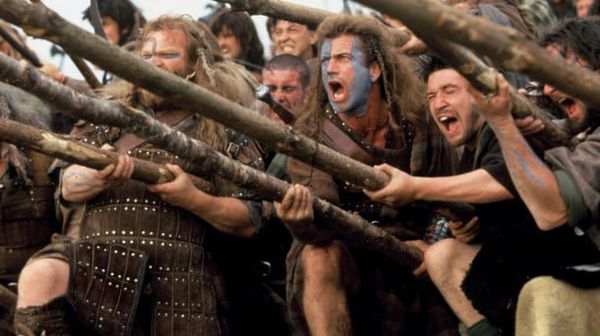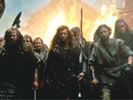Eye For Film >> Movies >> Braveheart (1995) Film Review
Braveheart
Reviewed by: Symon Parsons

Braveheart begins with William Wallace still a young lad. After his dad is killed by Edward Longshanks' army he is taken under the wing of uncle "Obi-Wan" Wallace, who teaches him how to fight.
Flash forward several years and William (now played by Mel) returns to his home village where the oppressed locals aren't allowed to have weapons and have to put up with English soldiers doing naughty things to their women. When a soldier who bears an uncanny resemblance to Albert Steptoe tries it on with Mel's wife, he loses his temper and beats the English soldiers to a pulp armed only with a rock and pointy stick. Having seen what a Scotsman can do with a pool cue, I'm surprised he needed the rock.

This is the trigger for INSURRECTION! Cue the warpaint* Cue the stirring speech! "They may take our land, but they'll NEVER take our FREEEEDOMMMM!!" Hooray! Let's go kick some English bahookie! (Oh, hang on, wait - I AM English).
Mel is held back by the feuding Scottish landlords and an indecisive Robert the Bruce. But on the battlefield he is unstoppable, burning garrisons, terrorising the occupying army and making horse-kebabs of the English cavalry. But things go badly wrong when the Scottish leaders discover Mel is Australian and leave him on the battlefield at Falkirk...
I have been told that, in terms of accuracy, Braveheart is a big pile of mince. In particular, George Macdonald Fraser said the film was an insult to the Scottish nation (and here I think he was referring to the depiction of the Scottish army as a rabble of willy-waggling bum-barers).
But films don't have to reflect reality completely, and I can forgive the odd inaccuracy (or even downright stupidity - how exactly DO you sneak into a man's bedroom while riding a horse?) It's genuinely stirring at times and reflects modern cynicism about politics well (beware, Donald Dewar). The battle scenes are bloody and brutal - the best I've seen since Excalibur.
Still, at the end, I couldn't help but feel an opportunity had been missed. Braveheart is comparable to Spartacus in terms of subject and scale, but lacks that film's gravity due to its unfettered romanticism. For example, the Scottish are presented here as sympathetic rogues, easily accessible to modern audiences with their groovy outfits and Bon Jovi hair, whereas the English are all Alan Rickman types in silly Blackadder costumes.
Spartacus did at least manage to convey the fact that the slave rebellion was led by men of a different time, and that their opponents were not entirely bloodthirsty fiends. As a result, this film works best as a romantic "William Wallace: Prince of Thieves". And I'm not saying this to be flippant about Scottish history (well, no more than this film is).
*Note to Mel: Easy on the blue foundation love! It may bring out your eyes but "less is more"!
Reviewed on: 16 Nov 2007



















